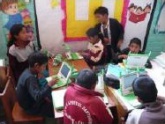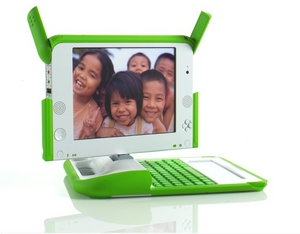The OLPC Wiki/lang-tr
| Çeviri-in The OLPC Wiki | özgün |
| english | عربي | پښتو | български | deutsch | español | français | kreyòl ayisyen | italiano | 日本語 | 한국어 | монгол | Bahasa Melayu | नेपाली | norsk | português | română | русский | kinyarwanda | türkçe | 中文 | 繁體中文 +/- | değişiklik |
OLPC Wiki, Her Çocuğa Bir Dizüstü Bilgisayar Edindirme projesine ve bu projeyle ilgili projelere ve topluluğa hoş geldiniz. Şu an 4171 sayfamız, yaklaşık iki bin dosya ve kaydolmuş iki bin katılımcı bulunmakta. Lütfen bize katılın ve fikirlerinizi bizimle paylaşın. Ayrıca wiki'ye ait olmayan laptop.org sitesi mevcuttur.
Değişiklikler
- Laptoplarda hangi yazılımların kullanıldığını mı merak ediyorsunuz? O zaman, Activities Tablosuna bakın.
- Give 1 Get 1 programnın bir parçası olarak bir laptop bağışlayın.
- Şu an deneme evresindeyiz, toplu üretime geçince yardım ve dönütleriniz takdir edilecektir. (Bakınız: Test issues).
- XO Laptop 2007 Index Award topluluk kategorisinde ödül kazanmıştır.
- Ivan Krstić has been named to Technology Review's prestigious TR35 List of Top Young Innovators. Ivan has been recognized by TR as one of the world's top innovators under the age of 35 for his work on OLPC’s innovative computer-security platform, Bitfrost.
- C1 machines have been built and are in Cambridge; these are the final test machines before mass production begins. They look sweet!
- Build 542.3, the latest stable build, shows off many important collaboration, connectivity, and Journal features, including: real-time collaboration in many activities (Write, Read, Chat, Record, Etoys, TamTam, Memorize, Connect4, etc.); support for automatic configuration of mesh portal points (MPP) and automatic configuration of ad-hoc meshes (allowing collaboration without any dependency on infrastructure or Internet access); anti-theft activation on installation; and registration with and backup to a school server. (See OLPC Trial-2 Software Release Notes and 542 Demo Notes). Note: Build 542 is not currently suitable for B2-1 systems; for those systems, please continue to use Build 406.15. (There are also notes on how to use some news features found in Build 608+ here.)
- Intel joins OLPC as its newest member.
- B4 machines are being distributed to developers who have joined the Developers Program. Those without machines can still run emulators on their current computers. Test Group Release Notes are being updated daily. Also, visit the Activities page to see the latest on activity developments.
- Visuals : We have a new skin for this wiki; thanks to Simon Dorner and the crew from OLPC Austria (you can change skins via Special:Preferences after you log in).
- You can now add an OLPC badge to your website.
- A report from OLPC in Nigeria: School Galadima
- OLPC won the Bridging Nations Bridge Builder Award: Technological Innovation for Bridging Digital Divide.
Weekly updates can be found in Current events.
About One Laptop per Child
- It's an education project, not a laptop project.
This is the wiki for the One Laptop per Child association. The mission of this non-profit association is to develop a low-cost laptop—the "$100 Laptop"—a technology that could revolutionize how we educate the world's children. Our goal is to provide children around the world with new opportunities to explore, experiment, and express themselves.
Why do children in developing nations need laptops? Laptops are both a window and a tool: a window into the world and a tool with which to think. They are a wonderful way for all children to learn learning through independent interaction and exploration.
OLPC espouses five core principles: (1) child ownership; (2) low ages; (3) saturation; (4) connection; and (5) free and open source.
More on the Laptop and OLPC's vision for learning.
Want to know more? Perhaps get involved?
A good place to start is the One Laptop per Child page, which gives an overview of the project. There is a list of frequently asked questions (FAQ); a place to ask a question; places to get involved, participate and current job openings; We can use some extra help translating and preparing content bundles in general, for example. There are numerous pages on hardware, software, content, and the developers program—and a separate wiki for software development. Sugar is a novel interface with its own interface guidelines. There are also discussion pages on issues of deployment and country-specific discussions. An extended table of contents is also available.
If you want to try out the laptop, it is not very difficult to emulate the XO on your PC. Better yet: you can support us by getting the real deal with Give 1 Get 1. The latest build is always available here. The latest stable build is always available here. (Please use 406.15 for B1 and B2 machines; please use 542.3 for B4 machines.)
About this wiki
The purpose of this wiki is to both share information about the project and to solicit ideas and feedback. The articles and discussion vary from technical to epistemological. We invite comments on every page (please use the "discussion" tab at the top of each page). Please restrict edits to the article pages themselves to facts, not opinions. You are encouraged to sign your work and to make liberal use of citations and links. (Please make an account and please use ~~~~ as a signature for your comments.) Please note that pages that include the {{OLPC}} template—such as this one—are maintained by the OLPC team and are generally representative of the current state of the project. Other pages—created and maintained by the public—should be read with that in mind.

